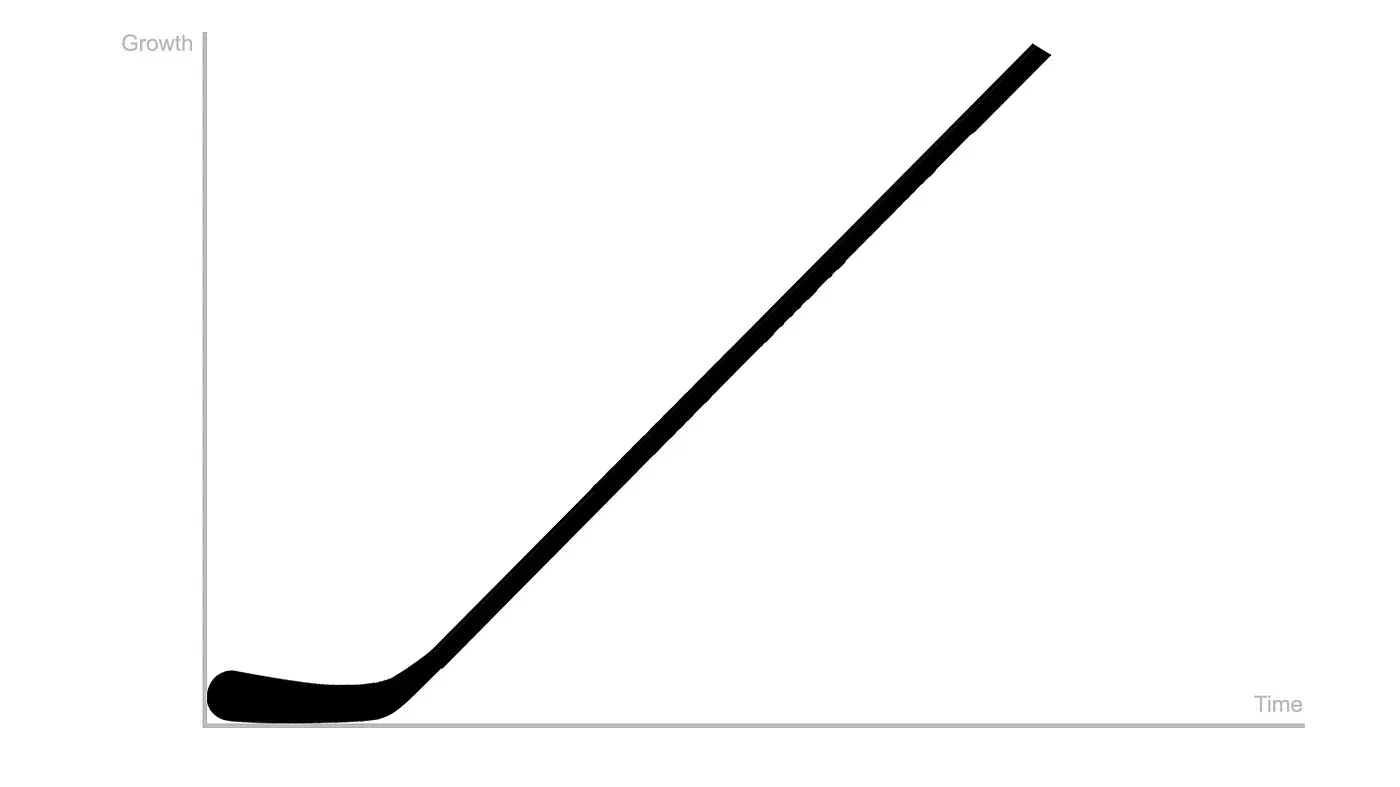Slow Down to Speed Up: The Hockey Stick vs. Staircase Approach
Working harder and faster is often not the answer to achieving your goals and is likely to end in burnout. Try this instead!

You’ve probably heard some variation of the adage:
In order to speed up, you have to slow down.
It’s a conversation I have with nearly all my consulting clients and something that none of them want to hear. They’re used to the go, go, go of their lives and feel like the only way to keep up is to go faster. To slow down often feels like a failure or admitting defeat.
They’re always hopeful that, with a few tweaks to their productivity practices, BAM everything will be under control again.
… Buuuuuuut they also work with me because they are so overwhelmed they can hardly decide what to have for breakfast, never mind what to do with their other life commitments. 😅
The hockey stick approach
This approach of going faster, working harder, and working more, is grounded in the assumption that these activities will produce outcomes equal to the work put in.
I call this the hockey stick approach:
The expectation that hockey stick effort will result in hockey stick growth or benefits.
For those that don’t know, hockey stick growth is when a business experiences sudden, rapid growth, after a period of flat or stable growth. When you plot it on a growth chart, it resembles a hockey stick.

Hockey stick growth is rare, but something that many businesses strive for. It mirrors the time, effort, and energy that many entrepreneurs put into their businesses and high performers put into their work. After initially settling into a venture or role, they push hard into go, go, go, and hustle, hustle, hustle without stopping… until they inevitably burn out.
Whether the hockey stick approach is applied to entrepreneurship, leadership roles, or just normal day-to-day life management, it has several fundamental problems:
1. Humans are not built to work all the time
Your mind and body require:
- Healthy food
- Sleep
- Exercise
- Play
- Connection
- Rest
You are not a robot. You have physical and mental health needs that need to be tended to, otherwise, you will wither. As I ask in 4 Ways to Make Self-Care a Competitive Advantage:
- Do you make good decisions when you’re tired?
- Are you productive when you're exhausted?
- Do you tolerate the inevitable annoyances of the day when you're drained?
- Are you creative and inspired when you're low energy?
The answer to all of these is always a big ol’ NOPE.
2. When you go too fast for too long, without breaking, you are much more likely to make mistakes and have communication breakdowns.
It’s like the metaphor of trying to build an aircraft while flying it. Pieces are going to drop out of the air, be ignored, get installed incorrectly, and eventually, you are likely to crash.
It’s unsustainable to go at full throttle all the time without building the basic aircraft, and occasionally landing for gas and maintenance.
In reality, this might show up as:
- Contracts that are never signed (which might bite you in the ass later).
- Not anticipating resource crunches around vacations or busy seasons.
- Not having good documentation or onboarding to quickly get new people up to speed when you need them.
- Keeping going on an idea that isn’t working for too long, instead of evaluating what’s working and what’s not and shifting down a more profitable path.
- Finishing a task and having to redo it because you didn’t stop to ask questions or communicate about the way forward.
Thanks for reading Every Intention! If you know someone who might like it too, please share it.
3. How long, fast and hard you work is not necessarily correlated to the outcomes you achieve
Though not the message you were likely raised with, working long and hard does not necessarily equate to success. Don’t get me wrong, I am not saying hard work is bad!
Hard work and long hours are often necessary components of success, but not on their own. Other components like rest, reflection, play, and strategic thinking, also play important parts, but only if given time.
4. There are opportunity costs to speeding ahead without slowing
When I say opportunity costs, I mean this both in terms of the business or project you are working on as well as in the other facets of your life.
It’s to your advantage to take time to be thoughtful and strategic in order to notice what’s working, what’s not, and iterate as you move forward. To be thoughtful and strategic requires rest and reflection, which can’t happen if you are going full speed at all times.
In other areas of your life, the opportunity cost is all the things you miss out on because you are so focussed on the go go go. As author Oliver Burkeman points out, “the average human lifespan is absurdly, terrifyingly, insultingly short.” Four thousand weeks if you’re lucky.
You have to be intentional about how you spend those four thousand weeks:
- What are you saying no to, every time you say yes to another meeting, another project, or another work commitment?
- What will you regret missing?

The staircase approach
The alternative I propose is the staircase approach:
When you work hard, experiment, take risks, and push yourself and then take time to slow down, rest, reset, and reflect to prepare for a new growth phase.
This approach allows you to:
1. Build a solid foundation
It’s during the slowdowns that you can be most intentional, thoughtful, and strategic about the best path forward. These are the times when you are able to do things like:
- Create documentation for easy access and decisions later.
- Establish an onboarding process to help you move quickly when you bring someone new on.
- Build rapport with your team members so you have solid working relationships.
- Address small problems before they escalate.
- Communicate clearly when setting direction.
- Notice areas of potential risks and plan for them.
If you take the time to slow down and build a solid foundation, it’s easier and faster to put the building blocks into place down the road.
2. Reflect and evaluate
When you slow down you are able to reflect back on what you’ve been doing and evaluate. Take the time to ask:
- What’s going well?
- What’s tricky or not working?
- What can you do differently going forward?
The answers to these questions allow you to pivot and alter your course, as well as notice potential opportunities and challenges that might come up along the way.

3. Set yourself up for the unexpected
Something (or several somethings) WILL go sideways. Someone will get sick, or you will have a family situation, a competitor will come on the market, or you will get sick. You can’t plan for everything, but you CAN make sure you have the flexibility to adjust when something comes up.
This might mean you:
- Leave space in your calendar each week for unplanned tasks and meetings.
- Include an extra week or two of padding in your schedule for a large project in case it needs extra time.
- Block off time after a major project or life event that you know will be draining so you have some time to recover.
Instead of living at 100% all the time and having things fall apart when an unexpected challenge (or opportunity!) arises, try to live at 80% so you can adjust as things happen and not be overloaded.
4. Enjoy the journey
Be ambitious, push yourself and work hard AND take time to rest, reflect, and be intentional.
It’s much too easy to speed past the daily gifts that life has to offer or endlessly push back the things and people that are important to us. Life can change fast and we need to celebrate the wins, big and small, with the people who matter.
Take the time to enjoy the journey.
You have to slow down to speed up. They are not opposing forces but instead complementary. When you give yourself the time and space to let things settle and take a breath, you set yourself up for whatever comes next. Keep moving ever forward, but slow it down for a bit so you can hit the ground running when you want to.
Need some help to slow down? Calming chaos is my superpower!
Share
Ashley Janssen

Productivity consultant, writer, speaker, serial entrepreneur, chaos calmer, introvert, cat-lady. Lover of books, fitness, old fashioned’s, basketball, and video games.
Follow me on
Twitter
or
LinkedIn.
Hire me for
1 on 1 productivity consulting
or
speaking.
Related articles

What It Really Means To Be Calm

September Crescendos


Comments ()